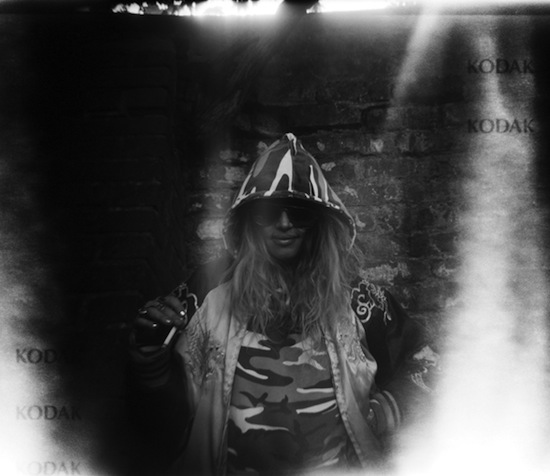All photographs courtesy of Cat Stevens
Royal Trux’s renaissance woman Jennifer Herrema returned to my consciousness with last year’s reissue of Veterans Of Disorder. When I heard her unmistakable drawl whipping up a “Bitches Brew” on ‘Witch’s Tit’ the stand out song from a startling album, the hairs on the back of my neck stood on end and a sweat bead crowd surfed across the top of them. I remembered what a truly great rock & roll icon she is. Jennifer Herrema has truly lived life with her foot on the accelerator. Starting as a teenager in a band with her boyfriend Neil Hagerty, Royal Trux finally made a noise sounding like the Rolling Stones smoking the bones of the Grateful Dead; a sound which Hagerty had obviously hankered after when he made his day-job band Pussy Galore record a cover album of Exile On Main Street.
Royal Trux signed with Virgin for some big bucks. They made their paeans to the 60s and 70s with a brace of albums the label found unwieldy but I found majestic. They then realised their homage to the 80s with their stone cold classic Accelerator back on spiritual home Drag City. On a meandering journey the Trux ingested punk, funk and glam along the way. It’s no coincide you can find the letters T-Rex in Royal Trux. Well, give or take an E.
Herrema embodied plenty of rock stereotypes and yet has always felt otherworldly, both muse and muso, Nico and Lou Reed rolled into one. Along the way she imbibed plenty of rock’s spirit too and ended up bottling her essence into a brand that’s become bigger than her still cult former band. Adopted as a poster girl for grungy heroin chic by Calvin Klein, she could have been one of rock’s casualties but to label her a survivor would be to belittle her contribution to alternative culture. Singer, producer, clothing designer for Volcom, artist, writer, interviewer, Herrema is far more than a triple threat. She’s a double triple threat. On the rocks.
She is a savant, an ingénue, seemingly caught in a dreamy fug of hazy memories but with clarity of vision and a restlessness of spirit that keeps her cutting through and making her relevant. And with the barbed hooks of ‘Physical Emotions’ on her second album as the leader of Black Bananas she sounds more current than ever. Electric Brick Wall is her poppiest album since Accelerator or Veterans, and certainly since the end of the Hagerty/Herrema double axis. And yet the pop is almost alien, starting with long beaty, cut & paste collages as if played through part broken beat boxes then hurtling into a blast of pop that’s part Prince, part Isley Brothers, all Herrema. It’s full of nonsense lyrics like all the best pop music is, and every song ends in a blaze of neon glory. It’s a messy moreish morass and yet simultaneously as tight as a pair of sprayed on jeans. The bubble writing had been on the brick wall that finally we’d get here to this righteous soundtrack to a psychedelic summer, not so much a block party as a rock party on Electric Avenue.
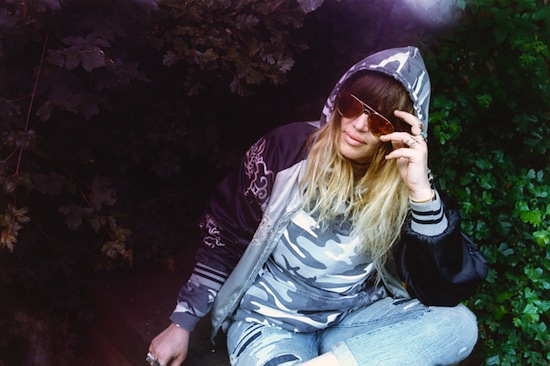
After Hagerty had left to form The Howling Hex, Jennifer kept the abbreviated band alive as RTX with new sparring partners Brian McKinley, Kurt Midness and Nadav Eisenmann. After three albums of rock riffs and royal re-treads they got their groove on and their dander up, striking out with their own name Black Bananas. The title of their first album in this incarnation Rad Times Xpress IV still suggested with the use of the R-T-X acronym that Herrema wasn’t totally ready to loosen that vice like grip on her illustrious heritage, even though “rad” tunes, full of funk and spunk like ‘Hot Stupid’ and ‘TV Trouble’ suggested it was time. These organ driven moments of brightness however did get a little way-laid in sluggish gloops of guitar. Electric Brick Wall has distilled the best bits of Rad Times and repackaged them in 40 oz bottles with snazzy labels that you don’t need to hide in paper bags to enjoy and as an album you always need to down in one since it totally hits that sweet spot.
Strangely this more deconstructed and undeniably dancey sound is also a feature of Royal Trux’s Radio Video EP, a late-era and oft-forgotten nugget about to get re-issued and re-evaluated on Domino Records. This is surely just alignment of the moons but it feels like Jennifer Herrema’s inner pop star is on the rise.
Herrema’s voice is both laconic and iconic. She’s been busy. Not that you’d know it from her lugubrious lilt. She’s been busy not just working out how to play the songs from Electric Brick Wall live on tour, but re-mixing Liars’ ‘Mess On A Mission’ and also writing a song for the forthcoming album by The Avalanches.
When I suggest I can hear The Isley Brothers’ ‘Who’s That Lady?’ in the new album she regales me with the hook. When I mention I also hear echoes of LL Cool J’s ‘Mama’s Gonna Knock You Out’ in album closer ‘Bullshit & Lies’ it hadn’t occurred to her but she reminded me she always wears one jean leg tucked into a boot and one out live as homage to Cool J.
Herrema has always been like a rock & roll magpie, attracted by the shiniest, coolest stuff and in collecting it she makes it very much her own, so I decided to find out why both the men and the ladies still love Cool JJ [her close friends call her JJ] but first I had to start with that first love, former partner in crime Neil Hagerty who has had a surprising hand in the new Black Bananas record.
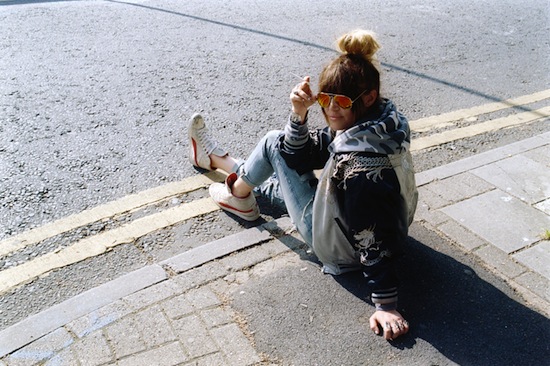
You mentioned before the album on Facebook that you’d be writing songs with Neil Hagerty which ones were they and how was that?
Jennifer Herrema: ‘Eve’s Child’ & ‘Powder’. It was simple basically. I had asked him. It was after he did the Twin Infinitives – like totally re-did Twin Infinitives live – I dunno it was basically a performance piece and I was like, ‘Whatever dude, what have you got going on?’ And he said he had a couple of songs he had been working on that he thought would be good for me so he sent over some of the lyrics and just kind of a real rough guitar structure and then I took his lyrics and added stuff to it to step away and then I showed the guys just the structure and we kind of built on it. It was pretty easy.
All done remotely, you weren’t in a room together?
JH: No no.
Have you spoken to him about how its come out?
JH: The album’s not out yet I don’t think he’s heard it.
I’ve heard it, he must have heard it surely.
JH: Well you heard it cos you’re a journalist you know. I don’t know that he’s heard it honestly.
How do you feel about those songs?
JH: Oh, well those two songs are great. They were recorded live. Those were the only two songs on the album that were recorded totally live. I kind of wanted to incorporate how it would sound live into the album as well as opposed compartmentalised sounds that come together to make what I call a three dimensional sound.
So we decided to record those particular tracks entirely live one take and I know that Brian and Kurt kind of wanted to re-do it and add stuff and I was no, this is a one-time thing and that’s it. We recorded it and that was it I put my foot down.
I really like the way it sounds. It sounds live it doesn’t sound perfect – there’s a couple of drum beats that are kind of fucked up and I don’t care. That’s the way we were playing live that day, it’s a snapshot. It’s not perfect by any means, there’s all sorts of ways we could have recorded those songs but that’s the way I chose to do it.
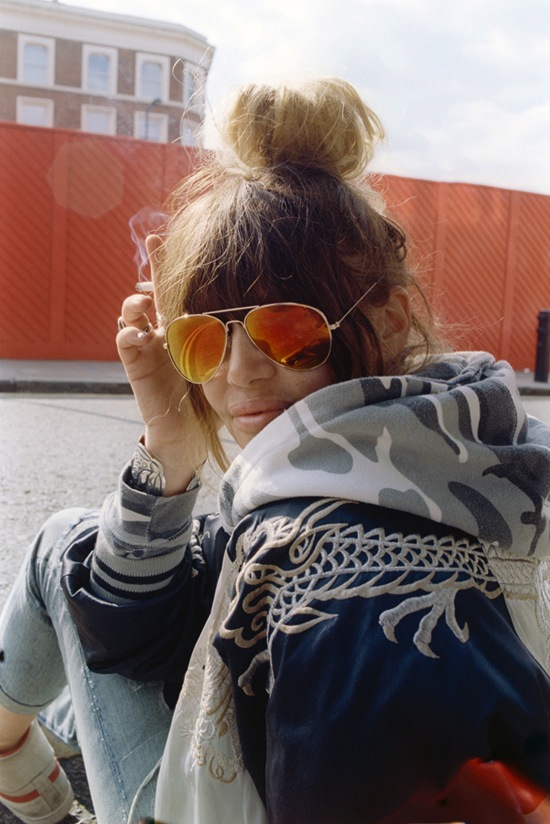
How do the three dimensional songs transfer to playing them live?
JH: It’s the three of us – me Brian and Kurt playing live. Kurt’s got a bunch of synths. Ryan’s playing a guitar but he’s also controlling a bunch of stuff via Ableton. I’ve got a couple of synthesisers I play and affect my own vocal while I’m singing. It’s working pretty well. We did this one show where we were playing the new songs a month ago and for some fucked up reason – it was at a festival – all of Kurt’s gear – his synths, his laptop – just nothing would power on. It was really fucked up so we had to play as a two piece me and Brian and we were like, “Fuck dude, huge parts of the songs aren’t gonna be there” but at the end it still sounded really good so that was kind of like encouraging.
How much fun was it to make?
JH: It was really fun because we just took our time. There’s so much that was recorded honestly and we just chose the material we were ready to put out. But some of the songs – ‘Dope On An Island’, ‘Ride The Chomp’, ‘Old Gold Chains’ – all those songs were just so fucking freestyle – vocals done once, we were coming out with music and just fucking around. We were all just like telling stories and getting stoned. I think the first one we wrote ‘Dope On An Island’ and ‘Highway Down’. With ‘Dope On An Island’ I was telling a story and then we were playing – there was music coming out and honestly, I wasn’t saying anything, I was just singing and the words were just coming out of my mouth to go with the music. And it was all based on the story I was telling those guys about something that had happened to me. Vocally it was total freestyle and I never went back and tried to understand what the fuck I had said.
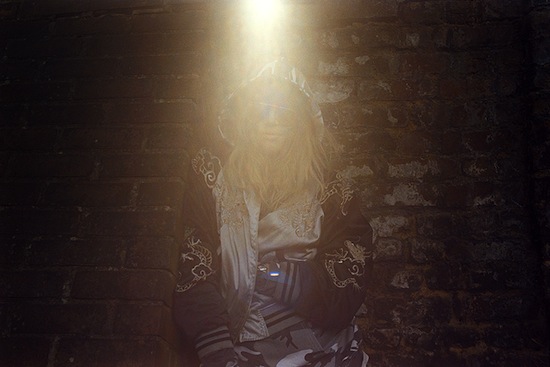
What was the story of ‘Dope On An Island’?
JH: I was stuck in a warehouse with a friend a long time ago like back in high school and we were tripping on acid and it just kept going round and round. I was on a mattress in the middle of a room and I thought it was a boat and there was this old guy that had been staying in this abandoned warehouse and there was no bathroom so he had taken what we call bumpers – 40 ounce bottles of beer and he would save them and pee in them, so it was just like 50 bottles of pee everywhere and I was stuck on the mattress which was my boat. And then the guy was on the island – he was the dope on an island – he just kept walking around pissing in these bottles. I was just telling this story and all of a sudden the shit came came out like a stream of consciousness.
To me ‘Physical Emotions’ is an out and out pop record, how would you describe it?
JH: Yeah I think it is. That one is very linear, that one is more two dimensional as opposed to ‘Dope On An Island’ which I consider three dimensional. It’s super linear and it was written by Kurt and myself and it’s just kind of based on touring. It was a tour story I don’t wanna get into, and we simplified it in the lyrics. We were talking about touring and what it feels like when you’re in the van and you’re going over bumps and you’re listening to music and it’s kind of like a vibration bed. It was just a weird conversation cos it’s like an emotion that’s physical feeling you have when you’re in the van. Really simple lyrics, I started writing stuff and he was paring it down and boom there it was. It was really easy.
Even ‘Creeping Out Of Line’ that was just like straight up improv vocal. I didn’t even know what I was gonna say. We were playing the music and all of a sudden and I was like “let’s just record”. I grabbed the microphone – that’s what the music made me feel. And I anticipate when we do certain of the songs live, like ‘Dope On An Island’ I just make stuff up. I make up new stuff. I kind of relate it to JJ Fad Supersonic where they just start making up words and they sound really cool – towards the end of the song. It’s just awesome sounds and I’m kind of into that. It’s not like I’m going to fuck it up on purpose but sometimes you just get an inspiration and you want a different sound and you add stuff and I dunno.
For someone who as you say doesn’t like to think much you work hard…you have a lot of stuff going on…
JH: I know, it sounds fucked up to say I don’t think much, I know I do, but I mean, it’s definitely on the level of ADD where it’s all over the place and kind of surface until it’s not, until I really zone in on something. Kind of by the time we were picking this stuff – we had so much recording – I really zeroed in and was able to just determine by intuition which were the songs I wanted to be on the record and how the mixes should sound and stuff a lot. I mean I do think a lot but I try not to. Sometimes I do just space the fuck out. It’s a major pastime.
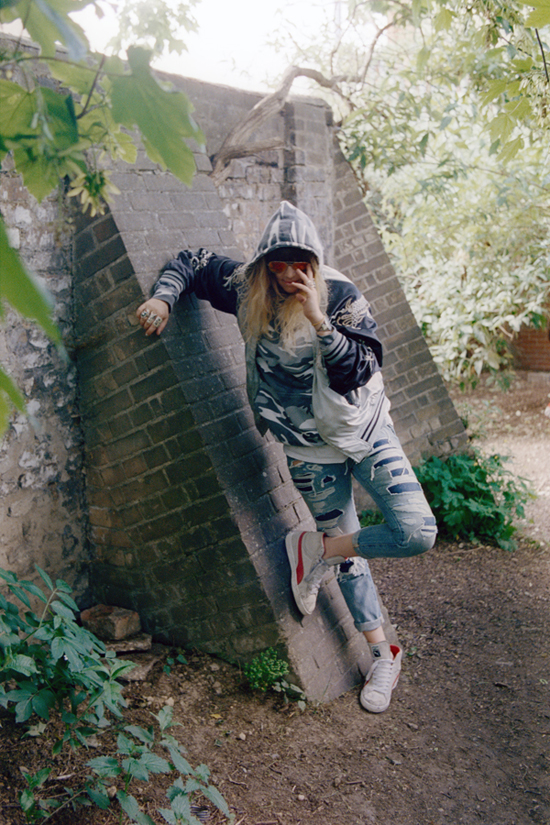
Tell us about the remix for Liars ‘Mess On A Mission’.
JH: The Liars asked if we would do a trade, they’d remix a song for us if we would do one for them and we were like, "Yeah ok", and they ended up doing ‘Physical Emotions’ and then they sent us ‘Mess On A Mission’ I guess a few weeks before they wanted to release it. So we kind of jammed on it and came up with two versions and let them choose. They were real different. The one they chose is way more streamlined and has more space, more openness. The other one was more about concentrating on the riffs. It was the antithesis of the one they picked, it was more like rocking. And it was sloppier and a totally different vibe and I liked that one a lot too but I pretty much figured they were gonna pick the one they picked.
Maybe you should have given them just the other one then?
JH: [Laughs] Yeah! Exactly!
And you’ve written a track for the new Avalanches record?
JH: Yeah, the ‘Stepkids’ one. Their dude at Modular the record label got in touch and said that Robbie wanted a song and sent the music and wanted a song about a lost kid, like a street kid, just something melancholy or whatever and thought that I’d be good at doing that and it turned out to be really easy. Actually Kurt and I did it together and then I sang it and sent it back over to them. Actually Robbie he wrote me last week and they’re gonna do a remix for this album and he updated me. He said that their album was gonna be done in three weeks and then he was gonna work on the Black Bananas remix. He told me the ‘Stepkids’ song he’d gotten some strings in there and he said it sounded awesome and I haven’t heard it but…
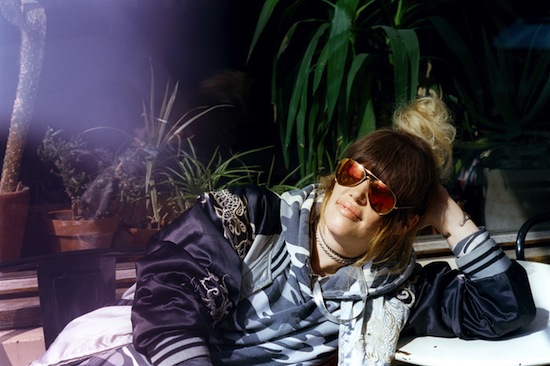
How does Electric Brick Wall compare to Rad Times Xpress IV?
JH: I think they’re both really good. I feel like this one’s dense with sounds but I feel like when I listen to it, it’s very light. How do you think they’re different?
I think this one’s more grab you round the throat instant than the first one. More in your face pop and it really zips along and before you know it, it’s finished.
JH: Yeah absolutely. We kept the songs short, and I wanted kind of lengthy intros and outros where there were no vocals – where we were just playing the music so it wasn’t total song structure and out, that’s the only thing that’s kind of not pop about it. But there’s definitely a lot of pop sensibility but at the same time it’s kind of anti-pop on a lot of songs where the vocals are part of the mix rather than up in your face – the lyrics are more important on some songs than others. On other songs the lyrics are just sort of sounds. They were just stream of consciousness. With a song like ‘Physical Emotions’ or even ‘Give It To Me’ those are both pop songs. There’s this one part, I think it’s ‘Creeping Out Of Line’. It was so random and it was after the fact but I was saying to Brian, “Dude this has got like a Style Council hook in it." It was really weird I was like, “Woah” but yeah the guitar tones and stuff and the way the guitar flows is way more open. More room to stretch out.
Royal Trux’ Radio Video EP is going to get re-released soon, how do you remember that record?
JH: I love that record. It was interesting. I had been arrested and I had to be in like a group, I had to go every day to this group in Culpeper, Virginia just to get my papers signed and I met this chick she had been in jail and they put her out as a firefighter. I don’t know what the deal was but she was a Baptist and she sang in the Baptist Church and we became good friends and I had her sing on it. I just remember it was a really good time. It was interesting as usual cos every time we ended up making a record there would be some strange person that would be brought into the fold and the dynamic would change which is always good because we were always looking to just have something to change it up. I haven’t listened to it in a while. They’ll probably send me the test pressing for the reissue and then I’ll probably listen to it, but the way I remember the time and the way I remember recording it and it coming about. I think at the time I was writing ‘Platinum Tips’ (on Pound For Pound) during that which is weird, it was really great I was really happy with it.
Has listening to the Royal Trux reissues fed back into the Black Bananas process?
JH: It’s pretty compartmentalised. I don’t listen to Royal Trux at all. I mean, I’ve listened to the past two – Veterans & Accelerator I listened to. Those are the two most recently and it was like listening to them for the first time almost cos I was so removed from it cos I hadn’t listened to it in ten odd years. And putting it on and just walking round the house and forgetting that I’m part of it or anything. I really enjoyed it. I loved it more than I did then. I didn’t know at all that that would be the case. But that’s that and Black Bananas is Black Bananas.
Hot Chip have remixed ‘TV Trouble’ how did you get to know them?
JH: They are good friends with Dan Koretsky who owns Drag City and they’re fans and so Dan suggested it and they were totally into it.
What do you think of their stuff?
JH: Yeah, I like Hot Chip. I like it for what it is. It doesn’t elicit any emotions. It doesn’t make me wanna party, it doesn’t make me wanna cry, it doesn’t make me wanna beat someone up; it doesn’t do any of those things. It’s kind of innocuous in a way and sometimes that’s a really good thing for me cos I do have a hard time listening to a lot of music I love cos I don’t hear it for what it is any more. I hear it and it takes me to another place and I can’t help that so it sucks and I have to take the fucking record off. It’s kind of a bummer.
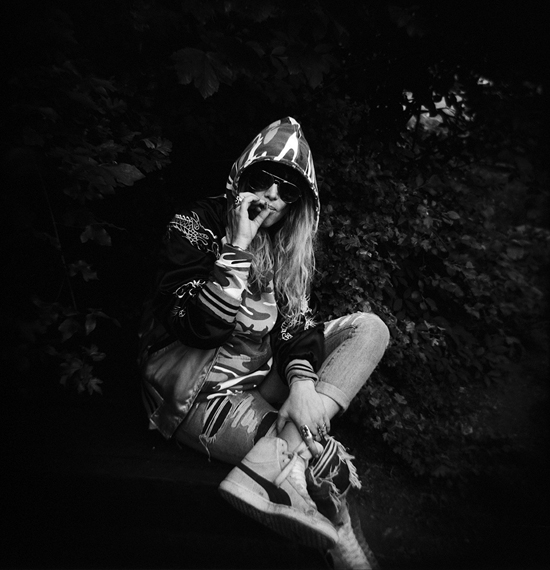
What are you most looking forward to about the new record?
JH: I like introducing things that are new and that are new to me. I feel like it’s a new sound. Not just a new sound to us. I don’t think there’s anything that sounds like it at all. I feel like you can totally feel our influences and stuff like that but the album as a whole, chapter to chapter, I just don’t feel like there’s anything out there like it and that always makes me happy but it’s also kind of like – it could easily be dismissed because it doesn’t fit, like where the hell does it fit?
Does that worry you then?
JH: No. That’s my whole life. That’s all my albums. Like you don’t know where the hell it’s gonna fit or if it’s gonna fit or if anyone’s gonna accept it for not fitting.
People seem to have a lot of time for you though…
JH: Yeah, I’m really grateful for that too cos it is what I do. Music is what I do. I don’t like really do much of anything else. I don’t have a job. I just sit around and think of stuff and write stuff and zone out and go to the studio and fuck around on synths. I guess having time is such a luxury to like create. It’s real organic. It’s not like, I’ve gotta go and do a song. And you can feel that in the recordings too.
But you do more than just the music though right – the art, the jewellery and fashion…
JH: I do that but the music is kind of at the heart of it, it kind of started it. Like when I started doing artwork for Royal Trux and then I was doing collages early early on and I just continued to do that. And then the whole fashion shit that kind of just came out of people wanting to put me in fashion shit but it came out of me being in Royal Trux or whatever band, so it’s all really integrated but it’s all music. It all comes back to music really and that’s all I do.

